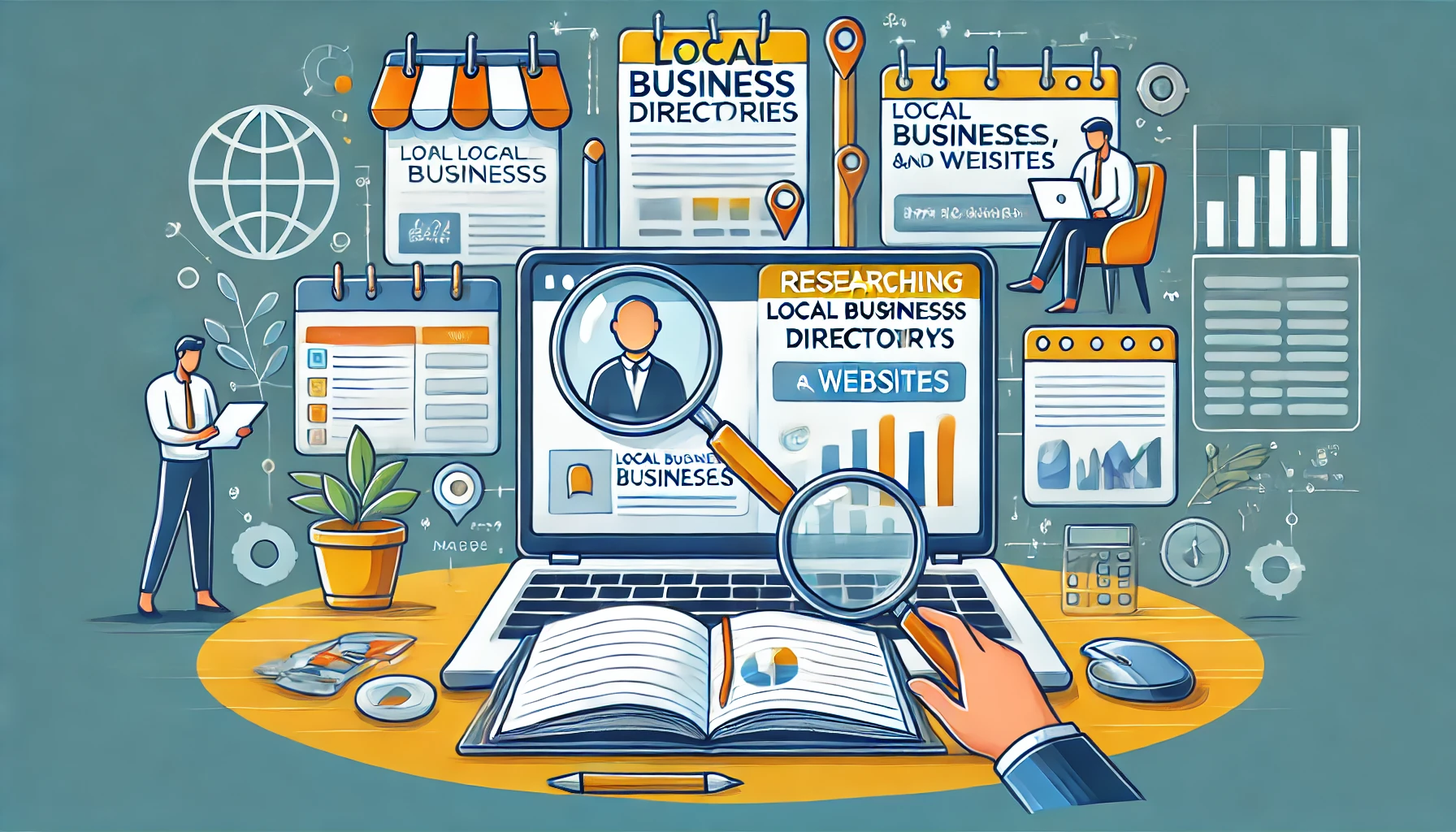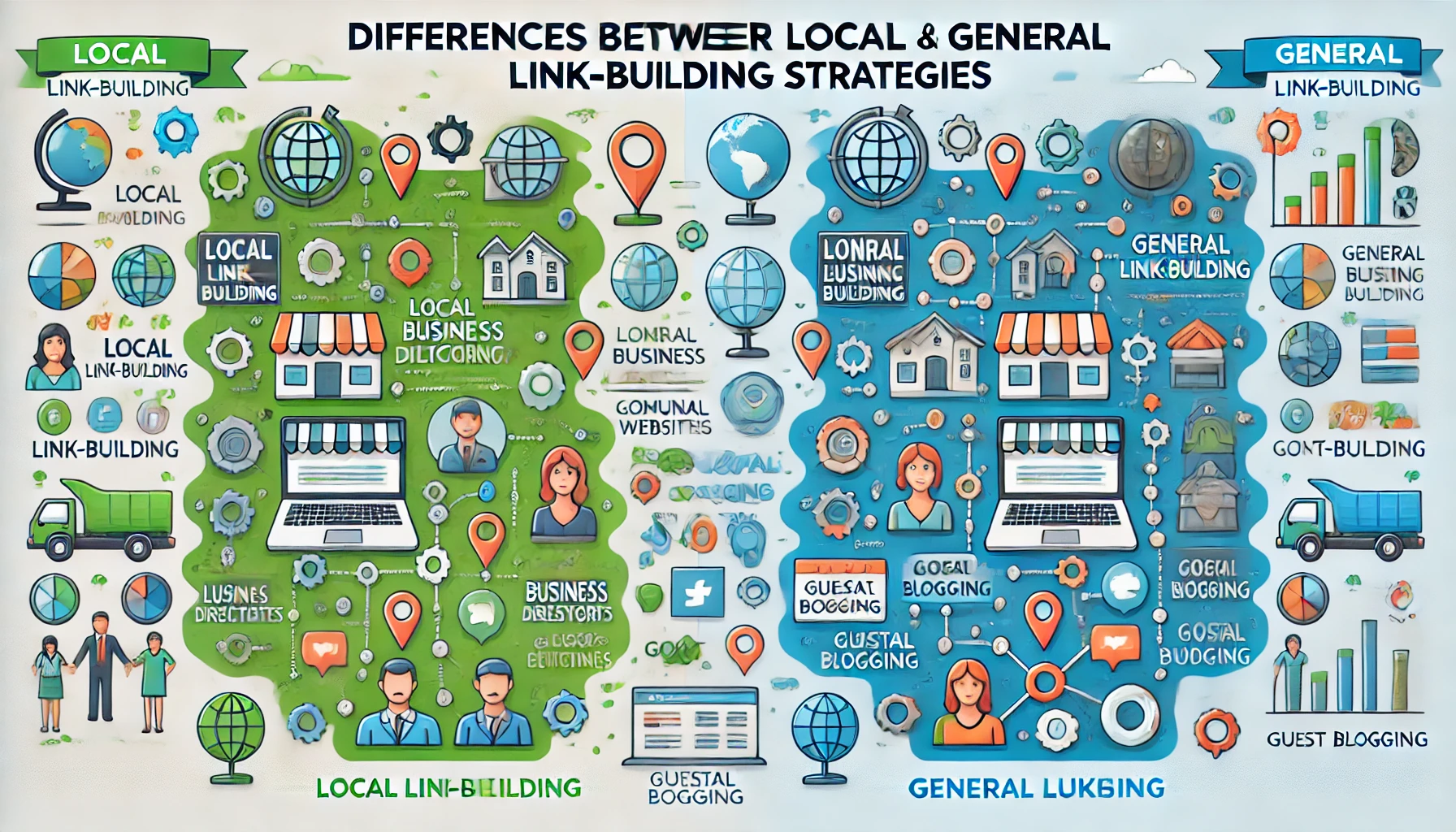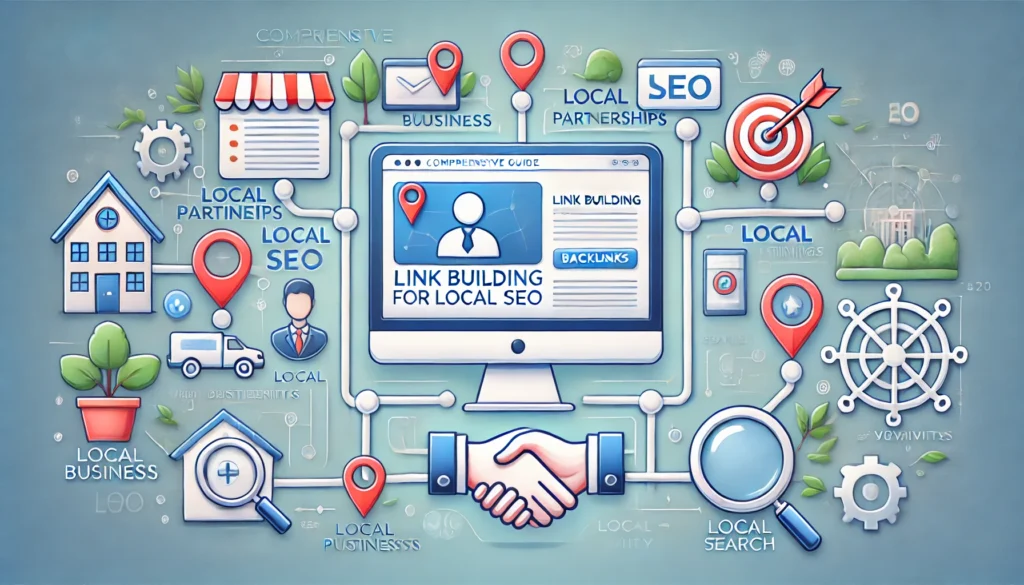Effective local link-building strategies are essential for enhancing your local SEO, which in turn can significantly improve your business’s visibility and search engine rankings in local search results. By focusing on acquiring high-quality, locally relevant backlinks, you can establish your business as an authoritative presence in your community, drive more local traffic to your website, and ultimately increase your customer base.
Table of Contents
ToggleUnderstanding Local Link Building
Local link building involves securing backlinks from local websites, businesses, and organizations. These local backlinks signal to search engines that your business is a relevant and trusted source within your geographic area, which can improve your local search rankings. Unlike general link-building, local link-building emphasizes community and regional relevance, making it a critical component of local SEO strategies.
Identifying Local Link Opportunities
To find local link opportunities, start by researching local businesses, directories, and websites that align with your industry. Engaging with local business associations and chambers of commerce can also provide valuable link-building opportunities. Additionally, connecting with local influencers and bloggers who have a strong online presence in your community can help you gain high-quality local backlinks.\
Leveraging Local Partnerships
Building partnerships with local businesses can be mutually beneficial and an excellent source of backlinks. Consider hosting or sponsoring local events, which not only raises your business profile but also provides opportunities for local media coverage and backlinks. Partnering with local charities and non-profits is another effective way to earn backlinks while contributing positively to your community.
Content Creation for Local Audiences
Creating content tailored to local audiences can attract backlinks from local websites and businesses. Write blog posts, guides, and case studies that focus on local events, news, and issues. Featuring local businesses and sharing their success stories can also foster relationships that result in backlinks.
Utilizing Local Directories and Citations
Submitting your business to local directories and ensuring your NAP (Name, Address, Phone number) information is consistent across all listings is crucial. Claim and optimize your Google My Business profile and other local profiles to improve your local SEO and increase your chances of earning local backlinks.
Engaging with the Local Community
Active participation in local forums and online communities can help you establish your presence and earn backlinks. Encourage satisfied customers to leave reviews and testimonials, and engage with local audiences on social media to build relationships and attract local backlinks.
Building Relationships with Local Media
Pitching stories to local newspapers, radio stations, and TV channels can result in valuable backlinks. Write press releases about your business’s local events or milestones and engage with local journalists and editors to increase your chances of media coverage and backlinks.
Monitoring and Measuring Success
Track your local link-building efforts using tools and methods designed to measure performance. Monitor key metrics such as local traffic, rankings, and engagement to assess the effectiveness of your strategies. Use this data to adjust your approach and continuously improve your local link-building efforts.
The Importance of Local SEO: A Brief Explanation

In today’s digital age, local SEO (Search Engine Optimization) has become a crucial aspect of online marketing for businesses of all sizes. It focuses on optimizing a website to be found in local search results, which is essential for attracting customers from specific geographic areas. This article delves into the importance of local SEO and why it should be a priority for your business.
1. Increased Visibility in Local Search Results
- Enhanced Online Presence: Local SEO helps your business appear in search results when potential customers search for products or services in your area. It is now easier for local customers to find you thanks to your enhanced visibility.
- Google My Business Optimization: By optimizing your Google My Business profile, you can appear in the “Local Pack” or “Map Pack,” which showcases the top local businesses related to a user’s query.
2. Higher Website Traffic
- Targeted Traffic: Local SEO drives targeted traffic to your website from users who are searching for local businesses. This raises the possibility that visitors will become clients.
- Mobile Search Dominance: With the rise of mobile searches, local SEO ensures that your business is visible to users searching on their smartphones, who are often ready to make a purchase or visit a store.
3. Building Community Engagement
- Local Community Connection: Local SEO encourages businesses to engage with their local community through content creation, events, and partnerships. This fosters a strong connection with local customers.
- Customer Trust and Loyalty: By appearing in local searches and being active in the community, businesses can build trust and loyalty among local customers.
4. Competitive Advantage
- Stand Out from Competitors: Many small businesses overlook local SEO, giving those who invest in it a competitive edge. By optimizing your local SEO, you can stand out in local searches and attract more customers than your competitors.
- Improved Local Rankings: Consistently implementing local SEO strategies can improve your rankings in local search results, making it easier for customers to find you over your competitors.
5. Cost-Effective Marketing Strategy
- Higher ROI: Local SEO is a cost-effective marketing strategy with a high return on investment. Unlike traditional advertising, it targets users who are actively searching for your products or services.
- Long-Term Results: Investing in local SEO provides long-term benefits. Once you achieve good local rankings, maintaining them requires less effort and expense compared to other forms of advertising.
6. Enhanced User Experience
- Accurate Business Information: Local SEO ensures that your business information (name, address, phone number) is accurate and consistent across all platforms, providing a better user experience.
- Reviews and Ratings: Encouraging customer reviews and managing your online reputation are integral parts of local SEO, helping potential customers make informed decisions based on others’ experiences.
7. Integration with Voice Search
- Voice Search Optimization: With the increasing use of voice search, local SEO helps optimize your business for queries made through virtual assistants like Siri, Alexa, and Google Assistant, which often have local intent.
The Role of Link-Building in Improving Local Search Rankings

Getting links from other websites to your own is known as link-building, and it’s a basic component of search engine optimization. In the context of local SEO, link-building plays a crucial role in enhancing your business’s visibility and ranking in local search results. This article explores the various ways link-building can improve local search rankings and why it is vital for your business’s online success.
1. Establishing Local Authority and Relevance
- Building Credibility: Links from reputable local websites, such as local news sites, blogs, and business directories, signal to search engines that your business is a credible and trusted source in your community.
- Demonstrating Relevance: When your business is linked to by local sites, it shows search engines that your content is relevant to users in a specific geographic area, which can boost your local search rankings.
2. Enhancing Visibility in Local Search Results
- Local Backlinks: Acquiring backlinks from local websites can improve your visibility in local search results. These local backlinks are seen as votes of confidence from your community, making it more likely that search engines will rank your site higher for local queries.
- Google My Business: Optimizing your Google My Business profile and linking it to your website can help you appear in the “Local Pack” or “Map Pack,” which highlights top local businesses.
3. Increasing Website Traffic
- Targeted Traffic: Links from local websites drive targeted traffic to your site from users who are interested in local businesses. This targeted traffic is more likely to convert into customers, providing a direct benefit to your business.
- Referral Traffic: Backlinks from authoritative local sites can lead to an increase in referral traffic, as users click through to your site from these links.
4. Strengthening Community Engagement
- Building Relationships: Link-building encourages you to engage with other local businesses, organizations, and influencers. These relationships can lead to more collaborative opportunities, such as co-hosting events or creating content together, which can further boost your local SEO.
- Supporting Local Initiatives: Participating in or sponsoring local events and initiatives can earn you backlinks from event websites and local news coverage, further enhancing your local online presence.
5. Competitive Advantage
- Outranking Competitors: Effective link-building can give you an edge over competitors who may not be focusing on local SEO. By securing high-quality local backlinks, you can improve your local search rankings and attract more customers than your competitors.
- Niche Dominance: Consistent link-building efforts can help you dominate your niche in the local market, making it easier for potential customers to find you over other businesses offering similar products or services.
6. Long-Term SEO Benefits
- Sustainable Rankings: Building a strong portfolio of local backlinks provides long-term benefits for your search rankings. Once established, these links continue to contribute to your SEO, requiring minimal ongoing effort to maintain.
- Authority Building: Over time, as you accumulate more high-quality local backlinks, your site’s overall authority increases. This can improve your rankings not only for local searches but also for broader search queries related to your business.
Overview of What the Article Will Cover

In this article, we will explore the crucial role that link-building plays in improving local search rankings. What to expect to learn is as follows:
- Introduction to Link-Building and Local SEO:
- Understanding the basics of link-building.
- How link-building integrates with local SEO efforts.
- Establishing Local Authority and Relevance:
- The importance of building credibility through local backlinks.
- How local backlinks demonstrate relevance to search engines.
- Enhancing Visibility in Local Search Results:
- The impact of local backlinks on search visibility.
- Optimizing Google My Business and its role in link-building.
- Increasing Website Traffic:
- Driving targeted and referral traffic through local links.
- The benefits of attracting visitors likely to convert into customers.
- Strengthening Community Engagement:
- Building relationships with local businesses and organizations.
- Supporting local initiatives and earning backlinks through community involvement.
- Gaining a Competitive Advantage:
- How effective link-building can help you outrank competitors.
- Achieving niche dominance in your local market.
- Long-Term SEO Benefits:
- Sustaining and improving search rankings with a strong local backlink profile.
- Building overall site authority through consistent link-building efforts.
Researching Local Businesses, Directories, and Websites

Researching local businesses, directories, and websites is a critical first step in building an effective local link-building strategy. Identifying relevant and high-quality local sources for backlinks can significantly enhance your local SEO and improve your search rankings. This section will guide you through the process of finding these valuable local link opportunities.
1. Identifying Local Businesses for Partnerships
- Networking with Local Businesses: Start by identifying businesses in your area that are complementary to your own. For example, if you run a fitness center, look for nearby health food stores, sports shops, and wellness clinics.
- Local Business Associations: Be a member of chambers of commerce and local business associations. These organizations often have directories of member businesses, which can be excellent sources of potential link partnerships.
- Industry-Specific Groups: Participate in local industry-specific groups and meetups. These gatherings can help you connect with other business owners who might be interested in reciprocal link-building.
2. Utilizing Local Directories
- Online Business Directories: Submit your business to local online directories such as Yelp, Yellow Pages, and other niche-specific directories. Make sure the details about your company are correct and consistent with each listing. qww
- Local Government and Community Websites: Many local government websites and community portals offer business directories. These sites are often trusted by search engines and can provide valuable backlinks.
- Local Chamber of Commerce: Listing your business in the local chamber of commerce directory can enhance your credibility and provide a high-quality backlink.
3. Researching Local Blogs and Influencers
- Local Bloggers: Identify bloggers in your area who write about topics relevant to your industry. Reach out to them for guest blogging opportunities, product reviews, or collaborations.
- Social Media Influencers: Look for local influencers on social media platforms who have a significant following. Partnering with them can help you gain exposure and earn backlinks from their profiles and blogs.
- Content Collaboration: Collaborate with local bloggers and influencers on content such as interviews, guest posts, or joint events. These collaborations can result in valuable backlinks and increased visibility.
4. Leveraging Local News Sites and Publications
- Local Newspapers and Magazines: Submit press releases about your business to local newspapers and magazines. Coverage in these publications often includes backlinks to your website.
- Online News Portals: Many local news websites have online directories or business sections. Ensure your business is listed and seek opportunities to be featured in articles.
- Community Newsletters: Participate in or sponsor community newsletters. These publications often highlight local businesses and can provide backlinks.
5. Engaging with Local Forums and Online Communities
- Local Forums: Join local online forums and discussion boards related to your industry. Participate in conversations and include your business link in your forum signature or profile.
- Nextdoor and Community Apps: Utilize community-based apps like Nextdoor to engage with local residents. These platforms often allow businesses to create profiles and share updates, which can include backlinks.
- Facebook Groups: Join local Facebook groups related to your industry. Share valuable content and engage with group members to build relationships and earn backlinks.
Differences Between Local and General Link-Building Strategies
Link-building is a vital aspect of SEO, but the approach varies significantly between local and general (or national/global) link-building strategies. Understanding these differences can help you tailor your efforts to maximize the effectiveness of your SEO campaigns. This section will explore the key distinctions between local and general link-building strategies.
1. Target Audience and Geographic Focus
- Local Link-Building:
- Geographic Specificity: Focuses on acquiring links from websites, businesses, and organizations within a specific geographic area. The primary goal is to improve visibility in local search results.
- Local Audience: Targets a local audience, often within a city, region, or specific community. This audience is more likely to convert into customers due to their proximity and immediate relevance.
- General Link-Building:
- Broad Reach: Aims to acquire links from websites with a national or global audience. The focus is on improving overall domain authority and visibility in broader search results.
- Wide Audience: Targets a wider audience, which can include users from various locations. This approach is suitable for businesses with a broader market scope.
2. Types of Link Sources
- Local Link-Building:
- Local Directories and Listings: Emphasizes submissions to local business directories, chamber of commerce listings, and community portals.
- Local News and Blogs: Seeks backlinks from local news websites, community blogs, and local influencers.
- Local Business Partnerships: Encourages collaborations and reciprocal link exchanges with other local businesses.
- General Link-Building:
- Industry-Specific Directories: Focuses on submissions to industry-specific directories and authoritative sites within a particular niche.
- National and Global Publications: Aims for backlinks from high-authority publications, well-known blogs, and major news outlets.
- Content Marketing and Guest Blogging: Prioritizes guest blogging on popular industry blogs and creating shareable content to attract links from a wider range of sites.
3. Link-Building Techniques
- Local Link-Building:
- Community Engagement: Involves participating in local events, sponsoring community activities, and engaging with local organizations to earn backlinks.
- Local Reviews and Testimonials: Encourages positive reviews and testimonials from local customers on review sites and business profiles.
- Local Content Creation: Produces content specifically tailored to local events, news, and issues to attract links from local sources.
- General Link-Building:
- Content Outreach: Utilizes a broad outreach strategy to pitch content ideas and guest posts to industry-wide publications and blogs.
- Digital PR Campaigns: Conducts digital PR campaigns to get featured in major publications, news outlets, and high-traffic websites.
- Linkable Assets: Creates linkable assets such as infographics, comprehensive guides, and research studies to attract backlinks from a diverse range of sites.
4. Goals and Metrics
- Local Link-Building:
- Local Search Rankings: The primary goal is to improve rankings in local search results, particularly in the “Local Pack” and Google Maps.
- Local Traffic: Focuses on driving targeted traffic from users within the local area who are likely to visit the physical store or use local services.
- NAP Consistency: Ensures the consistency of Name, Address, and Phone number across all local listings and citations.
- General Link-Building:
- Domain Authority: Aims to increase overall domain authority and improve search rankings on a broader scale.
- Global Traffic: Seeks to attract a wide range of visitors from various locations, increasing overall site traffic and brand exposure.
- Brand Awareness: Enhances brand awareness and credibility on a national or global level through high-quality backlinks from authoritative sites.
How Local Links Influence Local Search Rankings
Introduction
If a business wants to draw clients from a particular location, local SEO is essential. One of the most powerful elements of local SEO is acquiring local backlinks. These local links significantly influence local search rankings, helping businesses to appear prominently in search results for their area. This article will explain how local links impact local search rankings and why they are essential for your business’s online visibility.
1. Establishing Local Authority
- Local Relevance: Links from local websites, such as local news outlets, blogs, and business directories, indicate to search engines that your website is relevant to users in that specific area. This relevance is a key factor in local search algorithms.
- Community Trust: When local websites link to your business, it signals to search engines that your business is trusted within the local community. This trust can boost your site’s credibility and authority in local search results.
2. Improving Local Search Rankings
- Higher SERP Position: Local backlinks can directly improve your position in local search engine results pages (SERPs). Search engines prioritize results that appear more relevant and authoritative for local queries, and backlinks from local sources contribute to this.
- Enhanced Local Pack Presence: The “Local Pack” or “Map Pack” displays a selection of local businesses at the top of search results. Local backlinks help improve your chances of being featured in this highly visible section, driving more traffic to your business.
3. Increasing Website Traffic
- Targeted Traffic: Backlinks from local websites bring targeted traffic to your site. These visitors are more likely to be interested in your products or services because they are located in the same area.
- Higher Conversion Rates: Local traffic often converts at a higher rate compared to broader, less targeted traffic. Visitors from local backlinks are more likely to engage with your business, leading to increased sales and customer loyalty.
4. Enhancing Google My Business (GMB) Signals
- GMB Profile Links: Local backlinks can strengthen your Google My Business profile. By linking your GMB profile to local websites and ensuring consistent NAP (Name, Address, Phone number) information, you can improve your local search visibility.
- Local Reviews and Mentions: Positive mentions and reviews on local websites that link back to your GMB profile can enhance your reputation and ranking in local searches.
5. Supporting Content and Engagement
- Local Content Creation: Creating content that resonates with the local audience and earning backlinks from local websites can enhance engagement and visibility. Articles, blog posts, and guides that address local issues or events are likely to attract local backlinks.
- Community Involvement: Participating in local events, sponsoring community activities, or partnering with local organizations can generate backlinks from event pages, news articles, and community websites.
6. Building Local Citations
- Consistent Citations: Local citations (mentions of your business on other websites) that include backlinks help reinforce your business’s local presence. Consistent citations across local directories and websites enhance your credibility and search engine rankings.
- Authority Building: High-quality local citations from reputable sources can build your business’s authority, further boosting your local SEO efforts.
7. Competitive Advantage
- Outranking Competitors: Securing local backlinks can give you a competitive edge over other local businesses. Search engines are more likely to rank your site higher if you have a strong local backlink profile compared to your competitors.
- Niche Dominance: A robust local link-building strategy can help you dominate your niche within the local market, making it easier for customers to find you over other similar businesses.
Researching Local Businesses, Directories, and Websites
Introduction
To effectively build local links and improve your local SEO, it’s crucial to research and identify local businesses, directories, and websites that can provide valuable backlinks. This process helps you find high-quality local sources that can enhance your online presence and search rankings. Here’s a step-by-step guide on how to research and utilize these local link opportunities.
1. Identifying Local Businesses for Partnerships
- Networking with Local Businesses:
- Complementary Businesses: Identify businesses in your area that complement your own. For example, a coffee shop might partner with a local bakery or bookstore. These partnerships can lead to mutual backlinks.
- Local Business Associations: Be a member of chambers of commerce and local business associations. These organizations often have directories of member businesses, providing excellent sources for link partnerships.
- Industry-Specific Groups: Participate in local industry-specific groups and meetups. These gatherings are opportunities to connect with other business owners who might be interested in reciprocal link-building.
- Using Local Business Networks:
- Community Events: Attend local community events, trade shows, and business expos to network with other local business owners.
- Collaborative Projects: Consider joint marketing campaigns, co-hosting events, or creating bundled offers with other local businesses. These collaborations can naturally lead to backlinks.
2. Utilizing Local Directories
- Online Business Directories:
- General Directories: Submit your business to popular local directories such as Yelp, Yellow Pages, and Citysearch. Make sure all of the listings for your company have correct and consistent information about it.
- Niche Directories: Look for directories that are pertinent to your industry and business. For example, a health clinic might list itself on medical directories specific to its region.
- Local Government and Community Websites:
- Government Portals: Many local government websites maintain business directories. Being listed on these trusted sites can provide valuable backlinks.
- Community Portals: Look for community-focused websites that offer directories or business listings. These might include neighborhood associations, local tourism boards, and community bulletin boards.
- Chamber of Commerce Listings:
- Membership Benefits: Becoming a member of your local chamber of commerce often includes a listing in their business directory, which can enhance your credibility and provide a high-quality backlink.
- Events and Sponsorships: Participate in or sponsor chamber events. These activities often result in mentions and backlinks from the chamber’s website and promotional materials.
3. Researching Local Blogs and Influencers
- Local Bloggers:
- Identifying Relevant Blogs: Use search engines and social media to find bloggers in your area who write about topics related to your industry. Look for those with a good following and engagement.
- Guest Blogging Opportunities: Reach out to local bloggers to see if they accept guest posts. Offer to write informative content that would be valuable to their readers, including a link back to your site.
- Social Media Influencers:
- Finding Influencers: Identify local influencers on platforms like Instagram, Twitter, and Facebook. Look for those who have a significant local following and whose audience aligns with your target market.
- Collaborations: Propose collaborations such as sponsored posts, product reviews, or joint events. These activities can lead to backlinks from the influencer’s blog or social media profiles.
- Content Collaboration:
- Interviews and Features: Offer to interview local influencers or feature them on your blog. In return, they might link back to your site when they share the content with their audience.
- Local Roundups: Create round-up posts that highlight local influencers, businesses, or events. Inform those featured, as they are likely to share the content and link back to your site.
4. Leveraging Local News Sites and Publications
- Local Newspapers and Magazines:
- Press Releases: Submit press releases about significant business updates, events, or milestones to local newspapers and magazines. Coverage in these publications often includes backlinks to your website.
- Editorials and Features: Pitch story ideas or offer to provide expert commentary on relevant topics. Being featured in local news articles can provide valuable backlinks and increase your business’s visibility.
- Online News Portals:
- Business Sections: Ensure your business is listed in the local news site’s business directory. Look for opportunities to be featured in business-related articles or spotlights.
- Community Newsletters: Participate in or sponsor community newsletters. These publications often highlight local businesses and can provide backlinks.
- Community Newsletters:
- Participation and Sponsorship: Engage with community newsletters by providing content, news updates, or sponsoring issues. These newsletters often have a loyal local readership and can provide backlinks.
- Event Listings: Ensure your events are listed in community newsletters and calendars, which often include links to your website.
5. Engaging with Local Forums and Online Communities
- Local Forums:
- Active Participation: Join local online forums and discussion boards related to your industry or community. Participate actively by providing valuable insights and including your business link in your forum signature or profile.
- Forum Listings: Many forums have business listing sections where local businesses can post information and links.
- Nextdoor and Community Apps:
- Creating Profiles: Utilize community-based apps like Nextdoor to engage with local residents. Create a business profile and share updates, promotions, and events.
- Engagement and Interaction: Actively engage with the community by responding to queries, participating in discussions, and providing valuable information.
- Facebook Groups:
- Joining Groups: Identify and join local Facebook groups related to your industry or community interests. These groups can be excellent platforms for sharing content and earning backlinks.
- Sharing Content: Share valuable content, such as blog posts or event announcements, and engage with group members to build relationships and attract backlinks.
By making use of Chambers of Commerce and Local Business Associations
Introduction
Local business associations and chambers of commerce are valuable resources for businesses looking to enhance their local SEO and build strong community connections. These organizations offer a range of benefits, including networking opportunities, credibility, and valuable backlinks. This section explores how to effectively utilize local business associations and chambers of commerce to improve your local SEO.
1. Membership Benefits
- Credibility and Trust:
- Reputable Membership: Being a member of a local business association or chamber of commerce adds credibility to your business. These organizations are trusted by both consumers and search engines, which can positively impact your local SEO.
- Trust Signals: Membership badges and logos on your website can serve as trust signals to visitors, enhancing your business’s reputation.
- Networking Opportunities:
- Business Networking: Joining these organizations provides opportunities to network with other local business owners. These connections can lead to collaborative marketing efforts, referrals, and backlinks.
- Events and Meetings: Participate in networking events, meetings, and workshops organized by the association or chamber. These events are excellent platforms to establish relationships and discuss potential link-building partnerships.
2. Directory Listings
- Official Listings:
- Business Directory: Most local business associations and chambers of commerce maintain an online business directory. Ensuring your business is listed in these directories provides a high-quality backlink and increases your visibility to local customers.
- Consistent NAP Information: Make sure your business’s Name, Address, and Phone number (NAP) information is consistent across all listings. Consistency helps improve your local search rankings and credibility.
- Enhanced Profiles:
- Detailed Information: Create a comprehensive business profile in the directory, including a detailed description, operating hours, services offered, and a link to your website.
- Multimedia Content: Use multimedia content such as photos, videos, and logos to make your listing more engaging and informative, which can attract more clicks and engagement.
3. Sponsorship and Event Participation
- Sponsorship Opportunities:
- Event Sponsorship: Sponsor local events, seminars, and workshops organized by the association or chamber. Event sponsorship often includes mentions and backlinks on the event’s promotional materials and website.
- Community Initiatives: Sponsor community initiatives and programs. These sponsorships can lead to press coverage and backlinks from local media and the organization’s website.
- Participating in Events:
- Hosting Events: Host or co-host events such as workshops, seminars, or networking sessions. Hosting events positions your business as a community leader and often results in backlinks from event announcements and recaps.
- Event Listings: Ensure that your participation in events is listed on both your website and the organization’s website. Event listings typically include backlinks and enhance your visibility.
4. Content Collaboration
- Guest Contributions:
- Guest Blogging: Offer to write guest blog posts or articles for the association’s or chamber’s website or newsletter. These contributions can include backlinks to your website and help establish your authority in your industry.
- Expert Commentary: Provide expert commentary or insights for the organization’s publications. Being featured as an expert can enhance your credibility and provide valuable backlinks.
- Joint Content Projects:
- Collaborative Content: Collaborate on content projects such as guides, reports, or case studies relevant to the local community or industry. Jointly published content can be shared on multiple platforms, increasing the chances of earning backlinks.
- Video and Multimedia Content: Create video content or webinars in partnership with the association or chamber. These multimedia projects can be hosted on their website and YouTube channel, providing additional backlink opportunities.
5. Leveraging Social Media
- Social Media Mentions:
- Association’s Social Channels: Engage with the association’s or chamber’s social media channels. Share their content, participate in discussions, and ensure your business is mentioned and linked in their posts.
- Event Promotion: Promote events and activities organized by the association or chamber on your social media channels. Tag the organization and use relevant hashtags to increase visibility and foster engagement.
- Content Sharing:
- Cross-Promotion: Share your content with the association’s or chamber’s social media audience. Cross-promotion can lead to increased exposure and potential backlinks from their social media profiles to your website.
- Social Proof: Showcase your involvement with the organization on your social media channels. Highlighting these connections can build social proof and credibility with your audience.
Identifying Local Influencers and Bloggers
Introduction
Local influencers and bloggers play a significant role in enhancing your local SEO by providing high-quality backlinks and increasing your visibility within the community. Identifying and partnering with these local content creators can drive targeted traffic to your website and help build your brand’s authority. This guide outlines effective strategies for identifying local influencers and bloggers.
1. Using Social Media Platforms
- Instagram:
- Local Hashtags: Search for local hashtags relevant to your area and industry (e.g., #YourCityFoodie, #YourCityEvents). These hashtags can help you find influencers who are active in your community.
- Geotagged Posts: Look for posts tagged with your city or neighborhood. Influencers often tag their location, making it easier to identify those who are locally based.
- Twitter:
- Local Trends and Hashtags: Monitor local trends and hashtags to find influencers participating in local conversations. Connect with them by interacting with their material.
- Twitter Lists: Create or subscribe to Twitter lists that include local influencers and bloggers. These lists can provide a curated feed of relevant content creators in your area.
- Facebook:
- Local Groups: Join local Facebook groups related to your industry or community interests. Group admins and active members often have influence within the local community.
- Facebook Pages: Follow local business pages, community organizations, and event pages. Influencers often engage with these pages and participate in discussions.
2. Utilizing Influencer Marketing Platforms
- Influencer Discovery Tools:
- Platforms: Use influencer marketing platforms like BuzzSumo, Traackr, and Klear to search for influencers based on location and industry. These tools offer filters to narrow down your search to local influencers.
- Metrics: Evaluate influencers based on their reach, engagement rates, and audience demographics to ensure they align with your target market.
- Blog Directories:
- Local Blog Lists: Search for local blog directories or lists that feature top bloggers in your area. Websites like Bloglovin’ and AllTop can help you find blogs categorized by location.
- Industry-Specific Blogs: Identify blogs that focus on your industry and have a local angle. These blogs are more likely to resonate with your target audience and provide valuable backlinks.
3. Conducting Google Searches
- Targeted Keywords:
- Search Queries: Use search queries like “top [your city] bloggers,” “best [your city] influencers,” or “[your city] food bloggers” to find relevant local content creators.
- SEO Tools: Utilize SEO tools like Ahrefs or SEMrush to identify high-ranking local blogs and influencers based on your targeted keywords.
- Review Sites and Listings:
- Review Platforms: Check review sites like Yelp and TripAdvisor for local influencers who frequently review businesses in your area. Influencers often share their reviews on their blogs and social media.
- Top Lists and Roundups: Look for articles and roundups that list top local influencers and bloggers. These lists can provide a curated selection of influential individuals in your community.
4. Engaging with Local Media
- Local Newspapers and Magazines:
- Contributor Sections: Identify contributors and columnists who write for local newspapers and magazines. These writers often have their own blogs or social media followings.
- Editorial Features: Reach out to local journalists and editors who cover stories related to your industry. Building relationships with local media can lead to features and backlinks.
- Community Newsletters:
- Newsletter Contributors: Find out who contributes to community newsletters and local online publications. These contributors can be valuable influencers within your local market.
- Newsletter Features: Offer to contribute content to community newsletters. Featuring your business in these publications can provide exposure and backlinks.
5. Analyzing Competitor Backlinks
- Backlink Analysis:
- SEO Tools: Use SEO tools like Ahrefs, Moz, or SEMrush to analyze the backlink profiles of your local competitors. Identify the influencers and bloggers who link to your competitors and consider reaching out to them.
- Competitor Mentions: Monitor where and how your competitors are mentioned in local blogs and social media. These mentions can lead you to potential influencer partnerships.
- Content Gaps:
- Content Opportunities: Look for content gaps or topics that your competitors have not covered but are relevant to your audience. Pitch these ideas to local influencers and bloggers to create unique content collaborations.
- Collaborative Campaigns: Consider joint campaigns with influencers who have worked with your competitors. Collaborative efforts can provide mutual benefits and broaden your reach.
Conclusion:
Identifying and collaborating with local influencers and bloggers is a powerful strategy for enhancing your local SEO. By leveraging social media platforms, influencer marketing tools, targeted Google searches, local media engagement, and competitor backlink analysis, you can effectively find and connect with influential content creators in your community. These local influencers can provide high-quality backlinks, increase your website’s visibility, and drive targeted traffic, ultimately boosting your business’s credibility and online presence. Start building these valuable relationships today to take full advantage of the benefits local influencers and bloggers can bring to your business’s local SEO strategy.






